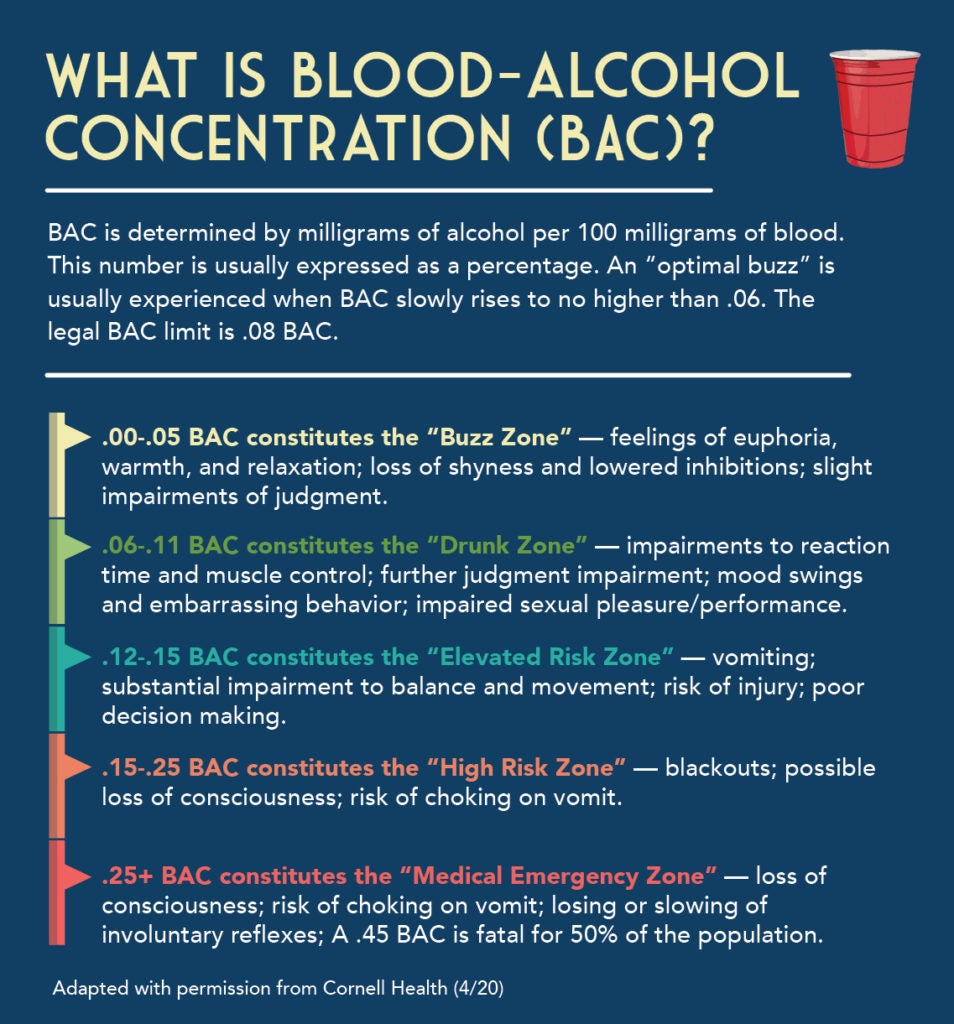Alcohol
Alcohol is the most used drug on college campuses, so it’s important to know some of the risks and effects of drinking alcohol.
What are some of the risks associated with drinking alcohol?
- Overuse of alcohol can have detrimental physical, emotional, and psychological effects.
- Alcohol consumption can lead to: increased short-term risks, including accidents, injuries, alcohol poisoning, violence, and unwanted sexual activity; longer-term health risks, including high blood pressure, heart disease, stroke, liver disease, digestive issues, and damage to other vital organs; aggravated mental health problems, including depression and anxiety; problems with academic performance, learning and memory, and loss of productivity; and dependency on alcohol as well as withdrawal related anxiety, nausea, hallucinations, and convulsions.
- Some factors can increase health risks of consuming alcohol and alcohol poisoning:
- Gender: women are more susceptible to the effects of alcohol because they produce less of the enzyme that slows the release of alcohol in the stomach.
- Size and weight: smaller and thinner body types absorb alcohol more quickly.
- Overall health: any preexisting conditions or underlying health problems can increase vulnerability to alcohol and its damaging effects.
What are the symptoms of alcohol poisoning? What should I do if someone has alcohol poisoning or has overdosed?
- Mental confusion/stupor/unconsciousness/coma, slurred speech, vomiting, nausea, seizures, poor coordination, slow/irregular breathing patterns (more than 10 seconds between breaths), low body temperature/bluish skin color/paleness.
- It is not necessary for all of these symptoms to be present before seeking help. If concerned about someone for any combinations of these symptoms, call GERMS (202-687-4357) immediately (Call 911 if off campus). By calling GERMS or GUPD, the patient and the individual reporting will not face disciplinary actions for alcohol related violations.
- Never leave the person unattended; turn the person on their side to avoid choking on vomit; if the person has been injured, do not move them, but wait for medical guidance.
How can I reduce the risks of alcohol consumption?
- Before drinking:
- Eat a filling and satisfying meal — the food will help your body process alcohol more slowly.
- Consider in advance how drinking may affect any other commitments you have.
- Have a plan for getting home safely — stick with the same group of friends, have a designated driver, or prepare to use a ride-sharing app at the end of the night. If drinking in the Georgetown neighborhood, students can call SafeRides (202-784-RIDE) for a free ride home.
- While drinking:
- Space and pace your drinking, sticking to about one drink per hour.
- Sip drinks, avoiding shots, funnels, or chugging.
- Avoid mixed drinks and punches, and stick to one type of alcohol or mixing your drinks yourself.
- Keep track of what you’re drinking, and how many drinks you’ve had. Set limits for yourself, so you know when it’s best to stop drinking.
- Alternate between alcoholic and non-alcoholic drinks to help slow your pace and stay hydrated.
- Avoid drinking if:
- You haven’t eaten
- You’re feeling Hungry, Angry, Lonely, or Tired (HALT)
- You’re taking prescription medications that could affect or be affected by alcohol (such as antibiotics)

Visit the Student Health Center’s overview of alcohol and other drugs for further information.
